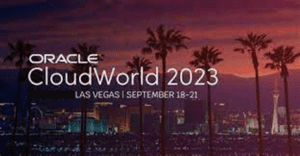
Oracle CloudWorld happened last week. There was a lot of content – too much to cover. But there were 5 main takeaways. I’m a supply chain industry analyst, so naturally my takeaways are influenced by my coverage area.
- Now that Steve Jobs is dead, Larry Ellison – the chief technology officer and executive chairman at Oracle – is the most interesting executive speaker. This year, Mr. Ellison spun a vision of how the global agricultural industry’s value chain could be reconstructed to improve the quality of food while making the industry much more sustainable. According to Mr. Ellison, food grown indoors with AI powered greenhouses has the potential to use 98% less water and 90% less land. Greenhouses can be constructed to be like semiconductor clean rooms which would eliminate the need for pesticides. Agriculture currently accounts for 30% of global greenhouse gas emissions. Greenhouses can be located near population centers and the growing season can occur all year long; this improves the freshness of food while reducing GHG emissions. Year round farming also means better job security for workers because farming is no longer seasonal. The work is also better because even for handpicked food, workers can work at a station, like in a factory, rather than doing stoop labor.To be price competitive, greenhouses need a complete growing system with watering system, sensors, and robotic automation. And of course, Oracle with their investments in Cloud computing, Internet of Things technology, and artificial intelligence can be used to minimize inputs while increasing productivity. Oracle’s client Making this transition, I believe, would face significant political issues. Nevertheless, Mr. Ellison presented a fascinating vision centered on how technology can be used to digitally disrupt a 10,000-year-old industry.
- At last year’s CloudWorld, Oracle presented their vision for transforming the healthcare industry by applying AI to vast amounts of anonymized patient record data. Generative AI is a major topic at all the enterprise events this year. Oracle has several use cases for how this technology can be used to improve their applications. One example from healthcare involves using generative AI integrated with Oracle’s electronic health record (EHR) solution to create a Clinical Digital Assistant that enables providers to use voice commands to produce rough drafts of new patient forms that would be reviewed but would still save significant labor. The digital assistants could also provide support for patients to take self-service actions such as scheduling appointments or checking clinical information at their convenience using simple voice commands.In the supply chain realm, Oracle added some healthcare functionality that allows for using a mobile device to better track inventory statuses. In hospitals inventory tends to be stored in all sorts of nooks and crannies across the facility. This is a relatively minor piece of new functionality.
More importantly, Oracle has assigned one of their best supply chain executives to improving solutions for this industry. The healthcare industry continues to run an inefficient supply chain based on an era when margins were much higher. With the Affordable Care Act, those days are gone. Hospital chains could greatly reduce costs while maintaining or even improving service if only they adopted supply chain best practices. This executive admits educating professionals in this industry has been a challenge.
- Perhaps the most interesting way generative AI can be used is to generate software code. Oracle’s solution is called Application Express (APEX). Mr. Ellison asserted that with the advances in generative AI, APEX can now write applications better than humans. He further asserted, most coding of Oracle’s Fusion applications – their enterprise applications – will henceforth be done by APEX. This is bold!
- Uber announced a new service called Collect and Receive that is based on Oracle technology. If an Oracle retailer – outside grocery where Uber already has a solution – is using Oracle Retail Cloud, they can support ecommerce and omnichannel solutions for consumers with minimal effort. There are thousands of retailers that use Retail Cloud. Many retailers have implemented complex distributed order management solutions in long, costly implementations to support new last mile capabilities. The Oracle Cloud/Uber solution is a much quicker and easier way to acquire these capabilities because the capabilities are enabled by configuration rather than having to put in a complex new system.This is an example of an ecosystem-to-ecosystem solution. Uber has an ecosystem. Oracle’s industry and Fusion solutions which, because they are based on a public cloud network, also form an ecosystem. This is a relatively new way for Oracle to go-to-market. I would expect to see other ecosystem-to-ecosystem solutions emerge, including new solutions in the supply chain realm.
- The supply chain solutions continue to be enhanced. There were numerous product enhancements, but the two major steps forward involved Oracle Order Management Cloud and Oracle Supply Chain Command Center.The Order Management Cloud solution has added new functionality to support product companies transitioning into service companies. For example, an air conditioning manufacturer might sell not just the air conditioner but a yearly service agreement. The order management system now must account for not just the sale of the product, but the details and timing of the related services. Revenue can only be incrementally accrued based on the timing of when the services have been completed. I’ve been doing a study of the distributed order management market and have not come across this kind of functionality.
The Supply Chain Command Center product demos beautifully. Other vendors have similar control tower type products that also look nice. The difference is that for a point solution supplier, a data store must be built, intensive integration must take place, and a major cleanup and mapping of data has to happen. It is all much easier for Oracle customers that have committed to the Oracle suite of solutions.

















